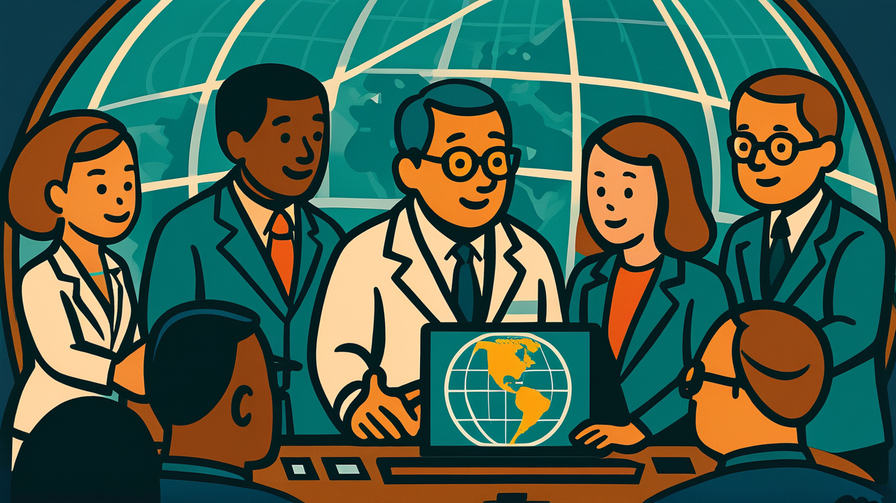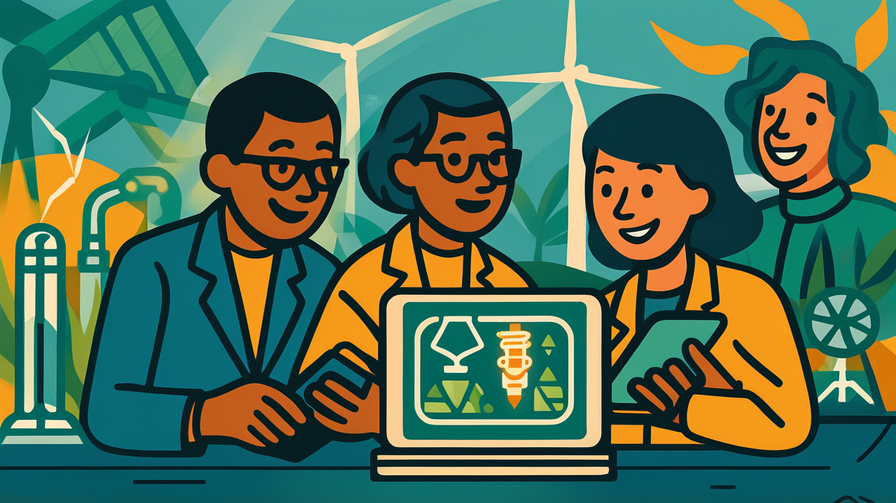[Disclaimer] This article is reconstructed based on information from external sources. Please verify the original source before referring to this content.
News Summary
The following content was published online. A translated summary is presented below. See the source for details.
The International Research Centre on Artificial Intelligence (IRCAI) and Amazon Web Services (AWS) have selected 23 innovative startups for the 2025 Compute for Climate Fellowship, a program funding AI-powered solutions to combat climate change. The diverse cohort includes companies working on vertical farming, fusion energy, sustainable materials, weather prediction, and ocean monitoring. Notable participants include 80 Acres Farm using indoor farming technology, Xcimer Energy commercializing laser-driven fusion, and Rainstick using bioelectric seed treatments to grow crops faster. Companies like Climate X simulate climate risks for financial institutions, while CounterCurrent optimizes shipping routes to reduce emissions. Each startup receives full funding for their proof-of-concept, access to AWS’s advanced cloud computing and AI technology, mentorship, and connection to IRCAI’s scientific expertise. Previous fellows like Aigen and Smartex report the program accelerated their development from weeks to days and helped them scale globally. The fellowship aligns with the UN’s Sustainable Development Goals, demonstrating how AI and cloud computing can address urgent environmental challenges across agriculture, energy, manufacturing, and transportation sectors.
Source: Amazon Press
Our Commentary
Background and Context

Imagine having a million-dollar budget and the world’s most powerful computers at your disposal to solve climate change. That’s exactly what’s happening with the Compute for Climate Fellowship. It’s like a reality show for saving the planet, but instead of voting people off an island, they’re giving 23 startups everything they need to build world-changing technology.
These aren’t just any startups—they’re using artificial intelligence and cloud computing to tackle climate problems in ways that seemed impossible just a few years ago. From growing food without soil to creating unlimited clean energy, these companies represent your generation’s answer to the climate crisis.
Expert Analysis
What makes this fellowship special is the incredible diversity of solutions. Let’s explore some of the coolest ones:
Future Food: 80 Acres Farm grows pesticide-free produce indoors using AI-controlled environments. Imagine fresh strawberries in winter, using 95% less water than traditional farming! Rainstick takes a different approach—they use electricity to mimic lightning’s effect on seeds, making crops grow bigger and faster.
Clean Energy Revolution: Xcimer Energy is working on fusion power—the same process that powers the sun. If successful, this could provide unlimited clean energy without any radioactive waste. Meanwhile, Eavor Technologies is drilling deep into Earth to tap geothermal energy anywhere, not just near volcanoes.
Smart Planet Monitoring: OnDeck AI uses AI to automatically monitor ocean health, while FortyGuard provides ultra-precise urban heat data to help cities adapt to rising temperatures. It’s like giving Earth a health tracker!
Additional Data and Fact Reinforcement
The scale and variety of these solutions is impressive:
• 23 startups from multiple countries selected
• Each receives full funding for their proof-of-concept
• Access to AWS’s advanced AI and cloud computing resources
• Previous participants like Aigen reduced development time from weeks to days
The startups cover every major environmental challenge:
• Agriculture: Vertical farming, bioelectric seeds, pathogen detection
• Energy: Fusion power, geothermal, smart grid management
• Materials: Recycled tire barriers, AI-designed sustainable materials
• Transportation: Low-carbon aviation, optimized shipping routes
• Monitoring: Weather prediction, ocean health, urban heat mapping
Related News
This fellowship is part of a larger trend where big tech companies are investing heavily in climate solutions. Microsoft has pledged to be carbon negative by 2030, Google is using AI to optimize its data center cooling, and now AWS is funding startups to scale climate solutions globally.
The timing is critical. The UN’s latest climate reports show we have less than a decade to make major changes. By combining AI’s problem-solving power with cloud computing’s massive scale, these startups could develop solutions faster than traditional research methods. It’s like the Manhattan Project, but for saving the planet instead of building weapons.
Summary

The Compute for Climate Fellowship represents a new model for tackling climate change: combine brilliant young minds with cutting-edge AI technology and unlimited computing power. These 23 startups aren’t just dreaming about solutions—they’re building them right now.
For students passionate about the environment, this shows that fighting climate change isn’t just about protesting or recycling (though those matter too!). It’s about innovation, technology, and creative problem-solving. Whether you’re interested in biology, computer science, engineering, or business, there’s a place for you in the climate tech revolution. These startups prove that your generation doesn’t have to wait for politicians or big corporations to act—you can build the solutions yourself.
Public Reaction
Environmental activists praise the program for moving beyond talk to action. Young entrepreneurs see it as inspiration, with many asking how to apply for future cohorts. Some critics worry about “tech solutionism”—believing technology alone can solve climate change without lifestyle changes. Previous fellows enthusiastically endorse the program, with Smartex reporting they’ve reduced textile waste globally thanks to the support. Investors are watching closely, seeing these startups as potential unicorns that could be both profitable and planet-saving.
Frequently Asked Questions
Q: How were these 23 startups chosen?
A: They were selected based on their innovative use of AI to solve climate problems, potential for real-world impact, and ability to scale their solutions globally with cloud computing.
Q: Can high school students get involved in climate tech?
A: Absolutely! Start by learning about AI and environmental science, join climate tech clubs, participate in hackathons, and build your own projects. Many of these startup founders began as students with an idea.
Q: Which of these technologies will have the biggest impact?
A: It’s hard to predict, but fusion energy could revolutionize clean power, while AI-powered agriculture could feed billions sustainably. The beauty is we don’t need just one solution—we need all of them!


